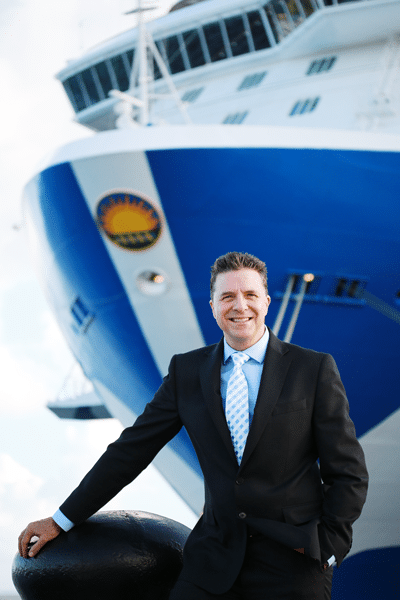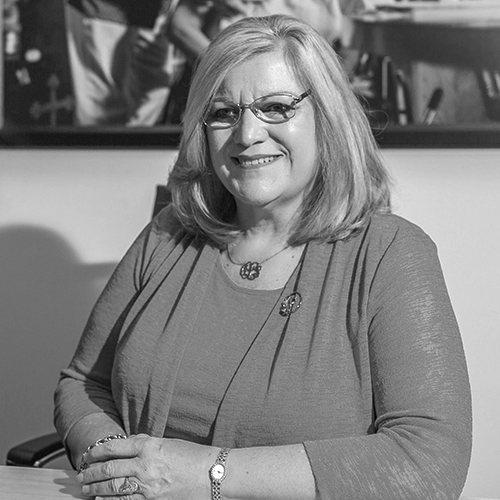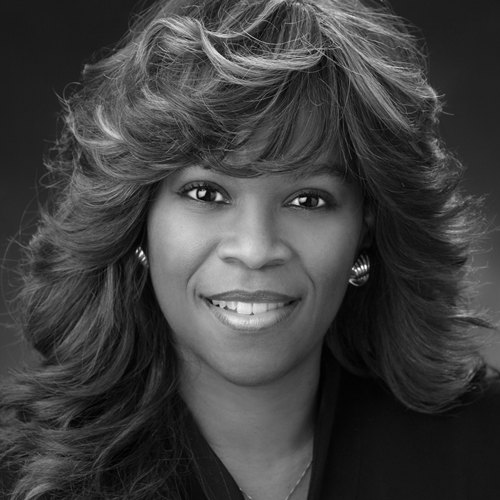Not many people are lucky enough to say they turned a vacation into a calling, but Grant Tarling can. He has combined his medical background with a love of international travel into a thirty-year career. Now, he is in charge of the medical and public health services of about eight million travelers and employees on sixty-five ships sailing to more than four hundred ports of call every year as Holland America Group and Carnival Cruise Line’s group senior vice president and chief medical officer.
Needless to say, Tarling’s is not the typical doctor story. “I took a convoluted path to where I am today,” he says. Born in Zimbabwe, Tarling moved to South Africa as a child. After high school, he entered the University of the Witwatersrand Medical School in Johannesburg, and graduated as an MD at the age of twenty-five. From there, he traveled to the United Kingdom and worked in several hospital systems. “I was considering entering a clinical specialty program, but I decided to take time off to work on a cruise ship as a physician for what was going to be a four-month working vacation,” he says. “I found the work in the remote locations and lifestyle fascinating and ended up staying.” Working every day for four months, followed by a two-month vacation, he was able to travel to every continent and immerse himself in different cultures and experiences. “This deeply shaped my view of the world and helped me better understand people and their diversity, but more importantly, also see our many similarities,” he says.

In 2001, he moved to Los Angeles and became the vice president and fleet medical officer for P&O Princess Cruises. In 2006, he was promoted to group senior vice president and chief medical officer. To further his education, he earned an executive master’s degree in healthcare administration and policy at UCLA in 2012. He is also an active member of the American College of Emergency Physicians (ACEP) and is entering his second two-year appointment as chairman of the ACEP cruise ship medicine section.
“Shaped by my upbringing in South Africa, I developed a passion for public health, which is a big part of my job. To strengthen my knowledge in this field, I obtained a global health certification from UCLA and became a Fellow of the Royal Society for Public Health,” he says.
Taking care of guests and employees in international waters presents quite the unique challenge and ensures that no two days are the same, Tarling says. “Most guests care needs are largely urgent or emergency medicine,” he says. “In contrast, our employees require mostly primary or preventive care, which requires us to have relationships with care providers globally and to coordinate the care provided onboard with that in an individual’s home country,” he says.
Tarling says many people envision a cruise ship’s medical facility as a first-aid clinic staffed by a retired doctor. But that perception couldn’t be more wrong. “Each ship’s modern medical center has a physical infrastructure that allows provision of a broad range of both ambulatory care services and inpatient hospital services,” Tarling says, including an ICU. It has a self-contained pharmacy, lab and imaging, which is staffed by a small physician-led clinical team. There are about eight hundred clinical staff working at sea whom are supported by about fifty staff in the United States distributed between offices in Los Angeles, Miami, and Seattle. “Of course, I cannot oversee all this without my great team, who are also diversified in terms of skills and experience,” he says.
Tarling’s day-to-day responsibilities encompass a wide variety of issues involving leadership, operations, clinical, financial, compliance, and public health matters. “It’s fantastic that we are building so many new ships, and I work on designing the next-generation cruise ship medical centers,” he says. Land-based chief medical officers, he says, have the primary responsibility of managing their health organization’s physicians, including hiring, evaluating, and training them to provide safe, effective medical services to the public. “However, my responsibilities are far broader,” he says. In addition to physicians, he oversees the nursing team and paramedics. He is responsible for all clinical operations, including medevacs, formulary, supplies, equipment, laboratory, and imaging. “I lead the enhancements to our highly customized EHR platform, and I oversee the governance functions to maintain our international healthcare accreditation through internal and external audit,” Tarling says. “Developing policies and procedures to support our more than four hundred quality standards is a continuous process.” He also oversees population-based public health services, including communicable disease prevention and control and environmental health, including food and water safety.
Along with getting to travel around the world, he is energized by the diversity of the guests and staff under his care. “We have more than one hundred different nationalities on our ships at any one time. I don’t know any other business that has that mix in such a small environment. It is inspiring to see how well everyone gets along in order to deliver memorable vacation experiences. This is the path I took into the industry, forged on travel and diversity, and I feel very much at home here.”
Tritan Software is the maritime industry’s #1 provider of health information and risk management platforms. Our specialized product suites provide our clients with the best in technology and operational innovation for managing the areas of health, compliance, and risk management. Tritan Software currently supports more than 95 percent of existing cruise lines with a rapidly growing presence in the shipping and energy industries.
Please visit www.tritansoft.com or contact +1.877.299.1000 for more information.


